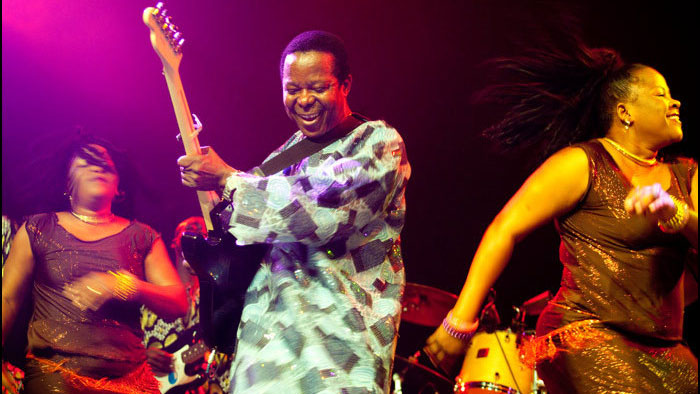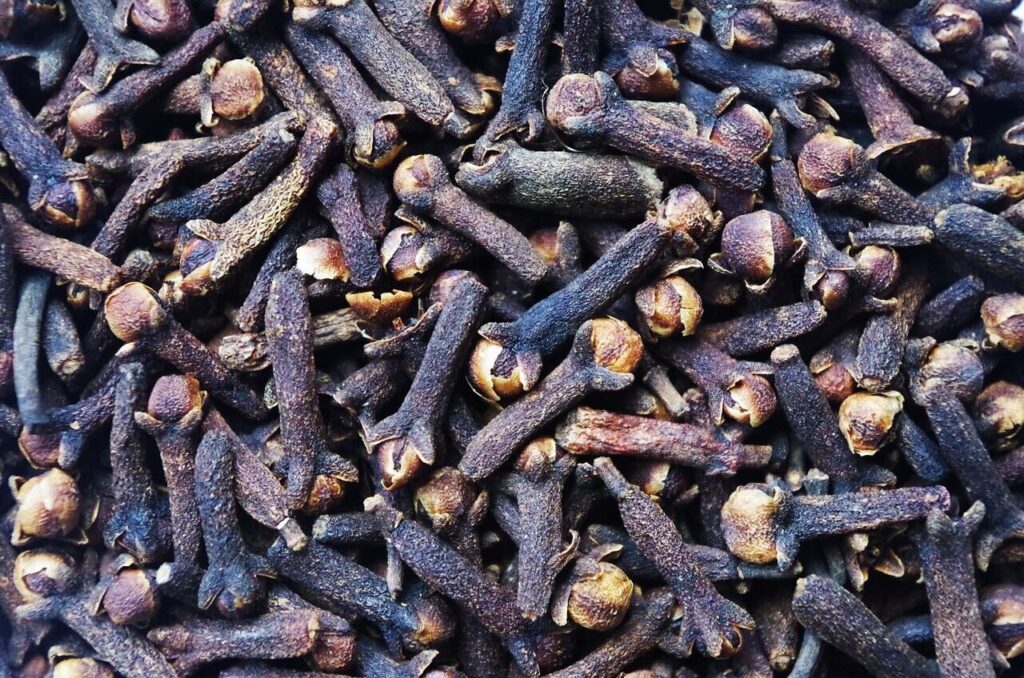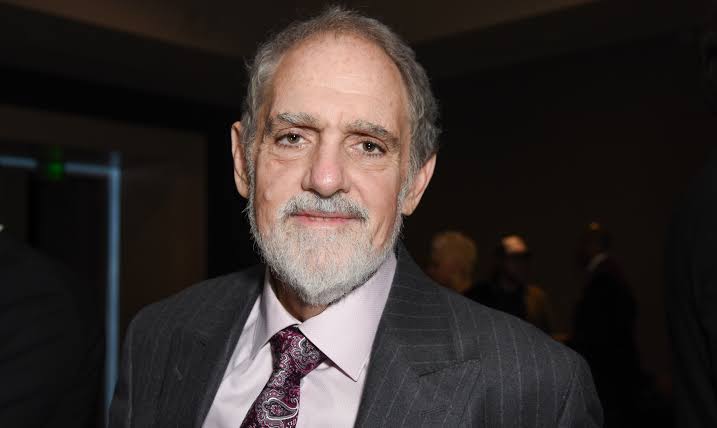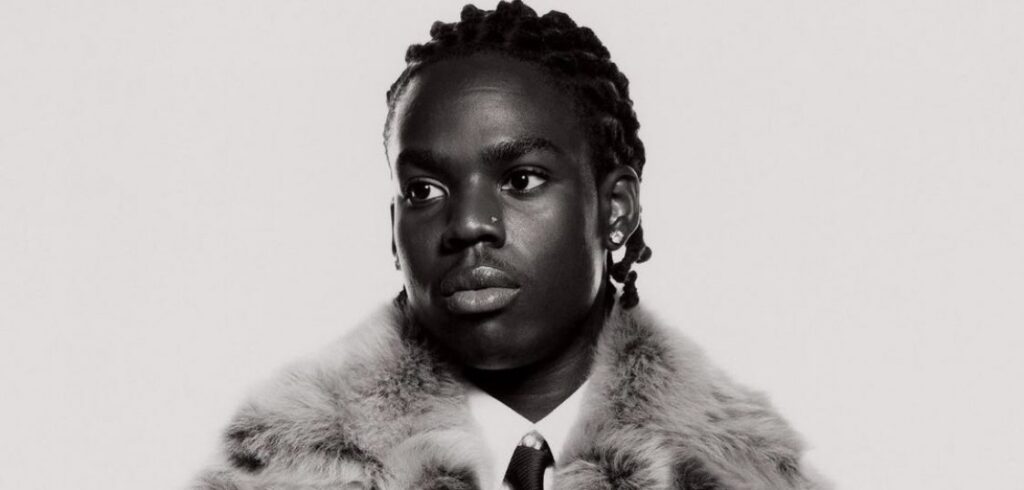Afrobeats isn’t just a soundtrack. It’s a vibrant kaleidoscope of infectious grooves, hypnotic rhythms, and searing social commentary, swirling together into a force that has taken the world by storm. But this global phenomenon wasn’t born overnight. Its roots lie deep in the rich soil of Nigeria, nurtured by the groundbreaking anthems of musical pioneers who dared to raise their voices against injustice and forge a new sonic identity.
Imagine the simmering heat of the 1960s and 70s Nigeria, a nation grappling with political upheaval and social discontent. It was in this crucible that artists like Fela Kuti, Tony Allen and Sonny Okosuns rose like musical titans. Armed with their instruments and boundless audacity, they crafted sonic weapons that resonated like thunder across generations and borders. Fela Kuti’s electrifying ‘Zombie’, a scathing indictment of military dictatorship, became an anthem of defiance, its pulsating rhythms and scathing lyrics a rallying cry for freedom. Sonny Okosuns’ ‘Fire in Soweto’, with its passionate vocals and searing guitar riffs, echoed the struggles of a continent facing the flames of apartheid. These were not mere songs; they were sonic Molotov cocktails, shattering the confines of entertainment and igniting a cultural revolution.
But the tapestry of Afrobeats wouldn’t be complete without the vibrant threads woven by other groundbreaking artists. King Sunny Adé, with his mastery of juju music, brought a mystical quality to the genre, imbuing it with a sense of otherworldly groove in tracks such as ‘Ja Funmi’. Ebenezer Obey, a towering figure in highlife and juju, enriched the Afrobeats landscape with his melodic touch, evident in hits like ‘Board Members’. And then there was Orlando Julius, whose innovative fusion of highlife and Afrobeat in anthems like ‘Ololufe’ played a pivotal role in defining the genre’s early identity.
The pioneers didn’t simply blend genres; they redefined them. Yoruba chants wove a spellbinding tapestry with funky basslines, jazz-infused improvisations danced with traditional Nigerian percussion, and soulful voices soared above it all. Their music wasn’t just a celebration; it was a weapon, a shield against oppression, and a platform for hope. As their anthems reverberated through the streets and across the airwaves, they gave birth to a genre that would captivate the world: Afrobeats.
This is the story we’re about to embark on: A journey through the pulsating rhythms and stirring lyrics of the very anthems that gave birth to Afrobeats’ magic. Prepare to encounter legends, to feel the electrifying energy of their music, and to witness how their spirit continues to inspire a new generation of artists pushing the boundaries of this ever-evolving genre. So turn up the volume, open your mind, and let’s delve into the story of Afrobeats, a story forged in the fires of pioneering anthems.
Dissecting The Sound, Fury Of Afrobeats
Imagine yourself transported to the scorching heat of 1960s Nigeria, a nation simmering with discontent and yearning for change. In this charged atmosphere, music wasn’t just entertainment; it was a weapon, a rallying cry, and a defiant dance in the face of oppression. This is where the pioneering anthems of Afrobeats were born, not merely songs, but sonic Molotov cocktails shattering the status quo and igniting a cultural revolution.
Let’s delve into the heart of this revolution, dissecting some of the most potent anthems that laid the groundwork for Afrobeats’ global domination:
Fela Kuti’s ‘Zombie’
A visceral assault on military dictatorship, “Zombie” pulsates with a hypnotic afrobeat groove, driven by Tony Allen’s polyrhythmic drumming that snakes around your ankles like a python. Fela’s scathing lyrics, ‘Zombie won’t go, unless you say go’, become an insidious mantra, condemning mindless obedience and exposing the hollow nature of authoritarian power with each chilling repetition. This electrifying track wasn’t just a protest; it was a psychological drill, a wake-up call disguised as an infectious dance beat.
King Sunny Adé’s ‘Ja Funmi’
Pulsating with a global heartbeat, ‘Ja Funmi’ explodes onto the scene, not with introspective whispers, but with a joyous declaration of Afrobeats’ arrival on the international stage. Its infectious melody, a catchy pop hook woven with the intricate magic of Juju polyrhythms, instantly burrows into your soul and makes you move. The lyrics, a hopeful plea for success and guidance, transcend language barriers, speaking the universal language of desire and ambition.
Sonny Okosuns’ ‘Fire in Soweto’
With its searing guitar riffs and passionate vocals, ‘Fire in Soweto’ is a searing indictment of apartheid’s injustice. Okosuns’ lyrics crackle with righteous anger, demanding an end to racial oppression and echoing the struggles of a continent in flames. The song is a sonic war cry, its driving beat pounding like a heart ready to burst, urging listeners to join the fight for freedom. This anthemic masterpiece transcended borders, becoming a rallying cry for anti-apartheid activists across the globe, a testament to the unifying power of music in the face of oppression.
Orlando Julius’ ‘Ololufe’
Imagine a catchy tune that explodes with joy, bridging cultures and making millions move. That’s ‘Ololufe’, the Afrobeats game-changer. It took the traditional grooves and gave them a pop twist, opening the door for Afrobeats to conquer the world, one dancefloor at a time. Its melody stuck like honey, its beat pulsed like a heartbeat, and its legacy as a pioneer still shines bright today. So, crank up the volume and let ‘Ololufe’ show you the magic of Afrobeats!
These are just a glimpse into the sonic arsenal of pioneering Afrobeats anthems. Each song pulsates with its own unique blend of musical elements, lyrical themes, and cultural impact. To truly experience their potency, listen to them – let the hypnotic grooves vibrate through your soul, understand the fire in the lyrics, and witness the defiant spirit that gave birth to a global phenomenon.
By analysing the intricate rhythmic structures of ‘Zombie’, delving into the rich symbolism of Yoruba imagery in ‘Ja Funmi’, feeling the raw emotion in Okosuns’ impassioned vocals on ‘Fire in Soweto’, and surrendering to the playful joy of ‘Ololufe’ sonic exploration, we gain a deeper understanding of the cultural context and musical ingenuity that birthed Afrobeats. These anthems weren’t just songs; they were weapons of resistance, expressions of identity, and celebrations of life in the face of adversity. They are the foundation upon which a global phenomenon was built, and their echoes continue to inspire artists and audiences alike, reminding us of the power of music to ignite change and connect us to something bigger than ourselves.
From Anthems To Evolution: How Afrobeats Blossomed Into Global Sound
The electrifying anthems of the past weren’t mere music; they were sonic seeds sown in the fertile soil of Nigeria. Seeds that, under the scorching sun of social change and the nurturing rain of artistic innovation, have blossomed into a vibrant, multifaceted tree: Afrobeats.
Femi and Seun Kuti, torchbearers of their father’s rebellious flame, didn’t merely mimic Fela’s thunderous roar. Femi, with his introspective lyricism in tracks like ‘Fight to win’, kept the protest fire burning while injecting contemporary elements like jazz chords in ‘Sorry Sorry’. Seun, in turn, defied genres, seamlessly blending Afrobeats with rock in ‘Black times’. They proved that the legacy wasn’t a rigid template, but a platform for creative exploration.
But Afrobeats wouldn’t be confined to a single lineage. Wizkid, with his honeyed vocals and infectious dancefloor anthems like ‘Ojuelegba’, and Davido, with his high-energy swagger in ‘Aye’, redefined the genre with a pop sensibility. Afrobeats blossomed into Afropop, captivating international audiences with its irresistible charm and radio-ready hooks. Songs like Wizkid’s ‘Come closer’ featuring Drake and Davido’s ‘Fall’ became global smashes, proving the genre’s irresistible appeal far beyond its Nigerian roots.
Afrobeats, however, wasn’t content with a singular groove. Alté Afrobeats, led by artists like Tems and Amaarae emerged as a sonic kaleidoscope. Think swirling psychedelia in Tems’ ‘Mr Rebel’ and Amaarae’s ‘Fountain baby’ album. These artists fearlessly experimented, blurring lines between Afrobeats and indie rock, electronic music, and even spoken word, showcasing the genre’s ever-expanding horizon.
The musical dialogue doesn’t stay within Nigerian borders. Burna Boy, with his Grammy-winning fusion of Afrobeats and American hip-hop in tracks like ‘Ye’, demonstrates the genre’s ability to absorb and reshape global sounds. Fireboy DML’s soulful R&B inflections in ‘Peru’ and Ckay’s Latin-tinged global smash ‘Love Nwantiti’ showcase the genre’s genre-bending prowess. Wizkid’s Collaboration with international artists like Beyonce in ‘Brown Skin Girl’ further cements Afrobeats’ place as a truly global language.
This constant evolution is the heart of Afrobeats’ magic. It’s a chameleon, adapting and thriving without losing its core identity. The anthems of resistance may not always be at the forefront, but their spirit lives on in the defiant spirit of experimentation, the relentless pursuit of new grooves, and the unshakeable confidence in the genre’s global appeal.
Afrobeats is a testament to the enduring power of music to evolve and connect. It pulsates with the echoes of the past, vibrates with the energy of the present, and dances towards a future full of possibilities.
Afrobeats Goes Global: From Lagos Streets To Stadium Stages
Imagine a sonic explosion that ripples from Lagos clubs to Coachella’s main stage, a rhythmic revolution shaking Spotify charts and fashion runways. This, my friends, is Afrobeats’ global conquest, a journey fueled by infectious grooves, captivating rhythms, and an unshakeable spirit that refuses to be confined by borders.
Gone are the days of Afrobeats simmering in local undergrounds. Globalisation, spurred by the internet and insatiable cultural exchange, has become the genre’s rocket ship. Diasporic communities across the globe, from London to New York, became loyal ambassadors, their love for the genre bridging distances and igniting international curiosity. Streaming platforms like Spotify and Apple Music, with their algorithms defying geography, became launchpads, offering instant access to Afrobeats’ vibrant universe.
But technology wasn’t merely a passive platform. Social media, like the potent gunpowder of the digital age, ignited Afrobeats’ global wildfire. Viral dance challenges to Ayra Starr’s ‘Bloody Samaritan’ and Davido’s ‘Unavailable’ swept across TikTok, captivating millions beyond language barriers. YouTube channels became global stages, showcasing the genre’s electrifying live performances and mesmerizing music videos. The world tuned in, mesmerised by the electrifying energy and cultural richness Afrobeats offered.
And then came the handshakes, the cross-cultural collaborations that shattered any lingering perception of Afrobeats as a niche genre. The lion king: Gift Album, Black Panther: Wakanda Forever Album , Spider-Man: Across the Spider-Verse Album and some other feature collaborations had some top Afrobeats artists in it. This act has demonstrated the genre’s effortless adaptability. These collaborations weren’t mere one-offs; they were testaments to the universal appeal of Afrobeats, its ability to transcend genres and speak directly to the soul.
The proof of Afrobeats’ global dominance lies not just in viral trends but in the concrete jungle of music charts. Burna Boy’s Grammy win, Wizkid’s chart-topping collaborations, and Ckay’s global smash ‘Love Nwantiti’ occupying top spots across continents are not mere victories; they are seismic shifts in the musical landscape. Afrobeats is no longer a whispered curiosity; it’s a force commanding attention, demanding its rightful place on mainstream stages.
But Afrobeats’ impact extends far beyond the realm of mere tunes. The genre has become a cultural tidal wave, influencing fashion trends with its vibrant colors and bold prints. From Beyoncé’s Afrobeats-inspired outfits in ‘Black Is King’ to the rise of Nigerian designers showcasing their work on international runways, the genre’s aesthetic influence is undeniable. And then there’s the dancefloor revolution. From the infectious ‘Shaku Shaku’ to the sensual ‘Azonto’, Afrobeats has the world moving in unison, its rhythms transcending languages and uniting bodies in a joyful celebration of life.
 Afrobeats’ global journey is far from over. The future holds new collaborations, chart-topping triumphs, and cultural exchanges that will continue to reshape the musical landscape. It’s a story of resilience, adaptation, and the unstoppable power of music to connect us across borders and make the world dance to its own joyful beat. So, turn up the volume, open your mind, and join the Afrobeats revolution. Because this isn’t just a genre; it’s a global movement, a celebration of rhythm, unity, and the unyielding spirit of music that knows no bounds.
Afrobeats’ global journey is far from over. The future holds new collaborations, chart-topping triumphs, and cultural exchanges that will continue to reshape the musical landscape. It’s a story of resilience, adaptation, and the unstoppable power of music to connect us across borders and make the world dance to its own joyful beat. So, turn up the volume, open your mind, and join the Afrobeats revolution. Because this isn’t just a genre; it’s a global movement, a celebration of rhythm, unity, and the unyielding spirit of music that knows no bounds.
The Future of Afrobeats: Where Global Grooves Meet Tomorrow’s Rhythms
Afrobeats isn’t just a genre; it’s a living, breathing organism, constantly evolving, pulsing with new possibilities. As we gaze into the crystal ball of its future, a kaleidoscope of vibrant trends and potential directions shimmers before us.
A new generation of artists is poised to push the boundaries even further. Tems, with her smoky vocals and introspective lyricism, and Amaarae, with her genre-bending experiments, are carving their own niches within Afrobeats. These rising stars, alongside established names like Fireboy DML, Tems, Ayra Starr, Ckay, Blaqbonez, Bloody Civilian, Odumodublvck, Asake, Fave , Joeboy, Bnxn, Teni and Rema, are proof that the genre’s wellspring of creative energy shows no signs of drying up.
The future of Afrobeats thrives on collaboration and exchange. Blending with Latin rhythms, drawing inspiration from K-pop’s dynamic choreography, or incorporating elements of traditional African music – the possibilities are endless. Imagine the electrifying energy of an Afrobeats-infused samba or the hypnotic fusion of traditional Senegalese drumming with Nigerian basslines. Cultural exchange promises to enrich the genre’s tapestry, fostering new sounds and expressions that will captivate audiences worldwide.
But amid the futuristic visions, it’s crucial to remember the foundation upon which Afrobeats is built. The fire of Fela Kuti’s anthems still burns in the social consciousness of artists like Mr. Eazi, the spirit of King Sunny Ade’s juju magic echoes in the textured melodies of Tiwa Savage. The pioneering anthems aren’t museum relics; they are living legacies, woven into the very fabric of the genre’s DNA.
So, what does the future hold? I predict Afrobeats becoming a true force in mainstream cinema, soundtracking action sequences and adding pulsating life to romantic comedies. Imagine Hollywood blockbusters pulsating with Afrobeats rhythms, the genre’s energy amplifying every chase scene and tender exchange. The sky’s the limit.
One thing is certain: Afrobeats is unstoppable. It’s a cultural supernova, its infectious energy supernova, its influence reaching farther than anyone could have imagined. As we dance to its vibrant rhythms, let’s remember the defiant spirit of its past and embrace the boundless possibilities of its future. Afrobeats isn’t just music; it’s a movement, a celebration of life, and a testament to the human spirit’s boundless creativity. So, crank up the volume, feel the beat, and get ready to move to the rhythm of Afrobeats’ magnificent future.











